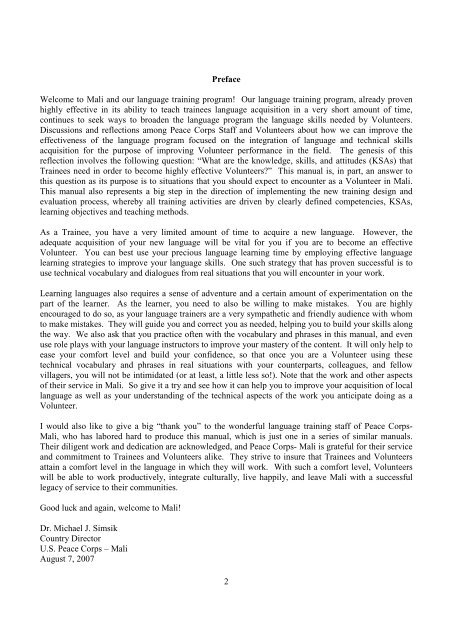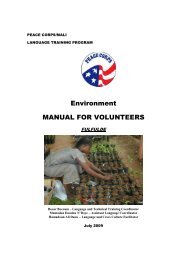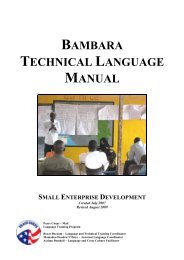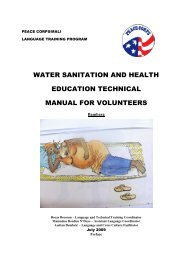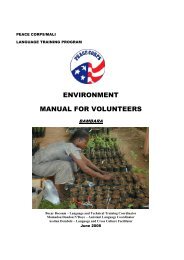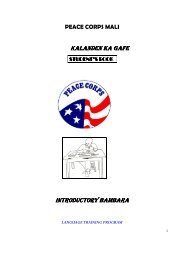SED FULFULDE TECHNICAL LANGUAGE.09 - Mali
SED FULFULDE TECHNICAL LANGUAGE.09 - Mali
SED FULFULDE TECHNICAL LANGUAGE.09 - Mali
You also want an ePaper? Increase the reach of your titles
YUMPU automatically turns print PDFs into web optimized ePapers that Google loves.
Preface<br />
Welcome to <strong>Mali</strong> and our language training program! Our language training program, already proven<br />
highly effective in its ability to teach trainees language acquisition in a very short amount of time,<br />
continues to seek ways to broaden the language program the language skills needed by Volunteers.<br />
Discussions and reflections among Peace Corps Staff and Volunteers about how we can improve the<br />
effectiveness of the language program focused on the integration of language and technical skills<br />
acquisition for the purpose of improving Volunteer performance in the field. The genesis of this<br />
reflection involves the following question: “What are the knowledge, skills, and attitudes (KSAs) that<br />
Trainees need in order to become highly effective Volunteers?” This manual is, in part, an answer to<br />
this question as its purpose is to situations that you should expect to encounter as a Volunteer in <strong>Mali</strong>.<br />
This manual also represents a big step in the direction of implementing the new training design and<br />
evaluation process, whereby all training activities are driven by clearly defined competencies, KSAs,<br />
learning objectives and teaching methods.<br />
As a Trainee, you have a very limited amount of time to acquire a new language. However, the<br />
adequate acquisition of your new language will be vital for you if you are to become an effective<br />
Volunteer. You can best use your precious language learning time by employing effective language<br />
learning strategies to improve your language skills. One such strategy that has proven successful is to<br />
use technical vocabulary and dialogues from real situations that you will encounter in your work.<br />
Learning languages also requires a sense of adventure and a certain amount of experimentation on the<br />
part of the learner. As the learner, you need to also be willing to make mistakes. You are highly<br />
encouraged to do so, as your language trainers are a very sympathetic and friendly audience with whom<br />
to make mistakes. They will guide you and correct you as needed, helping you to build your skills along<br />
the way. We also ask that you practice often with the vocabulary and phrases in this manual, and even<br />
use role plays with your language instructors to improve your mastery of the content. It will only help to<br />
ease your comfort level and build your confidence, so that once you are a Volunteer using these<br />
technical vocabulary and phrases in real situations with your counterparts, colleagues, and fellow<br />
villagers, you will not be intimidated (or at least, a little less so!). Note that the work and other aspects<br />
of their service in <strong>Mali</strong>. So give it a try and see how it can help you to improve your acquisition of local<br />
language as well as your understanding of the technical aspects of the work you anticipate doing as a<br />
Volunteer.<br />
I would also like to give a big “thank you” to the wonderful language training staff of Peace Corps-<br />
<strong>Mali</strong>, who has labored hard to produce this manual, which is just one in a series of similar manuals.<br />
Their diligent work and dedication are acknowledged, and Peace Corps- <strong>Mali</strong> is grateful for their service<br />
and commitment to Trainees and Volunteers alike. They strive to insure that Trainees and Volunteers<br />
attain a comfort level in the language in which they will work. With such a comfort level, Volunteers<br />
will be able to work productively, integrate culturally, live happily, and leave <strong>Mali</strong> with a successful<br />
legacy of service to their communities.<br />
Good luck and again, welcome to <strong>Mali</strong>!<br />
Dr. Michael J. Simsik<br />
Country Director<br />
U.S. Peace Corps – <strong>Mali</strong><br />
August 7, 2007<br />
2


